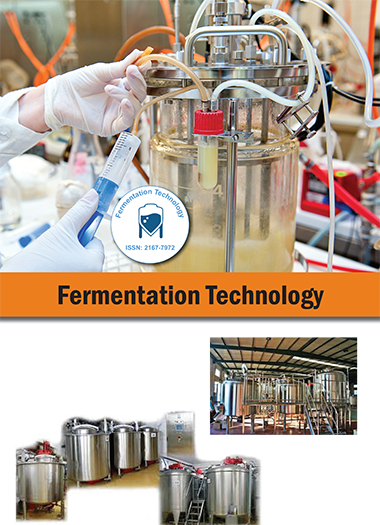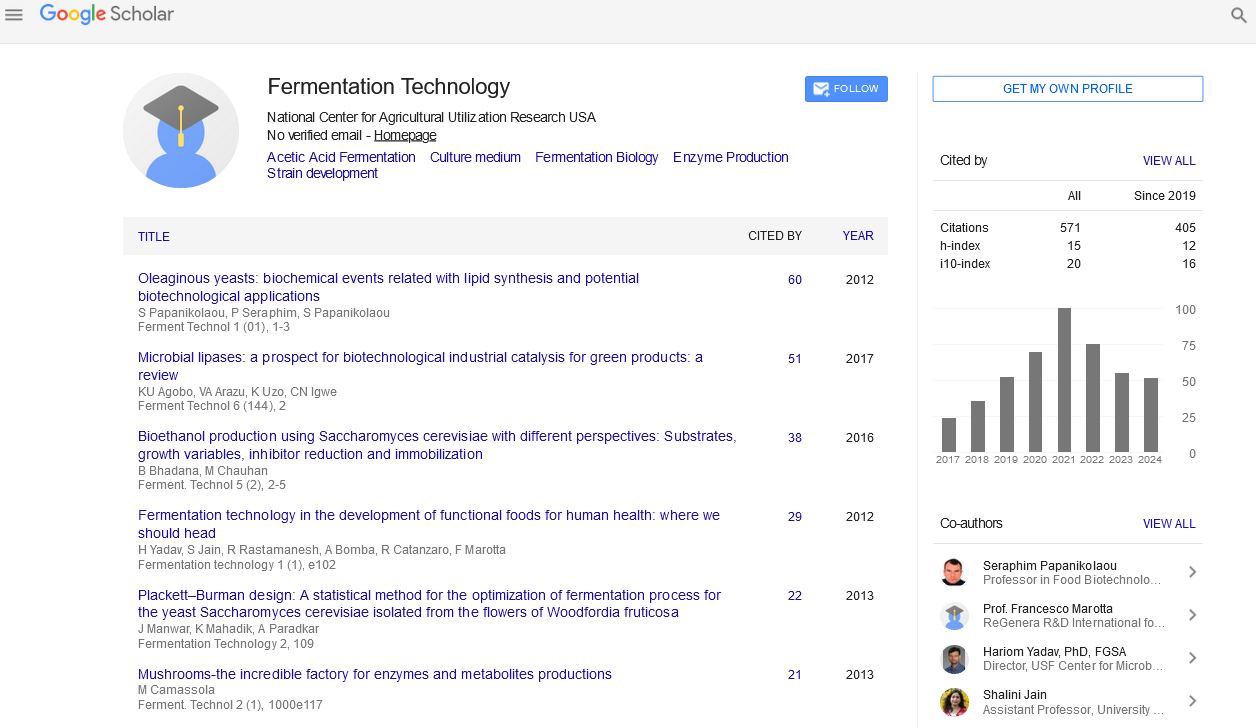Indexed In
- Open J Gate
- Genamics JournalSeek
- Access to Global Online Research in Agriculture (AGORA)
- RefSeek
- Hamdard University
- EBSCO A-Z
- OCLC- WorldCat
- Publons
Useful Links
Share This Page
Journal Flyer

Open Access Journals
- Agri and Aquaculture
- Biochemistry
- Bioinformatics & Systems Biology
- Business & Management
- Chemistry
- Clinical Sciences
- Engineering
- Food & Nutrition
- General Science
- Genetics & Molecular Biology
- Immunology & Microbiology
- Medical Sciences
- Neuroscience & Psychology
- Nursing & Health Care
- Pharmaceutical Sciences
Commentary - (2023) Volume 12, Issue 1
Benefits of Fermented Foods on Gut Health
Mac Jones*Received: 03-Mar-2023, Manuscript No. FMT-23-20065; Editor assigned: 06-Mar-2023, Pre QC No. FMT-23-20065(PQ); Reviewed: 21-Mar-2023, QC No. FMT-23-20065; Revised: 28-Mar-2023, Manuscript No. FMT-23-20065(R); Published: 07-Apr-2023, DOI: 10.4172/2167-7972.23.12.159
Description
Foods and drinks that have gone through controlled growth of bacteria and fermentation are known as fermented foods. By converting food components, like sugars like glucose, into other products, like acids that are organic, gases, and alcohols, microorganisms like yeast and bacteria perform the anaerobic process known as fermentation. The distinct and enticing flavour, aroma, texture, and appearance of fermented foods are due to this. There are thousands of fermented foods such as sour milk, yogurt, wine, beer, cider, tempeh, miso, kimchi, sauerkraut and fermented sausages. Most foods can be fermented from natural foods such as vegetables, fruits and grains. Dairy products meat, fish, eggs, legumes, nuts, seeds. While these foods are nutritious in their original form, fermentation may offer additional health benefits, especially if they contain probiotics and prebiotics. , are live microorganisms or bacteria that provide health benefits to the human body. The majority of strains of commonly researched species, including Lactobacillus and Bifidobacterium, are thought to help the gut by fostering a more favourable intestinal environment, according to experts. It's possible that some strains work better than others. Although some benefits are expected, there is insufficient evidence that all probiotics have these effects. Many fermented foods contain probiotics. This is because probiotics are added to or found naturally in food. For example, lactobacillus is a probiotic strain commonly found in yogurt and is naturally present on the surface of some foods such as vegetables and fruits. In particular, many commercially produced foods that are pasteurized kill all bacteria (along with associated health benefits). Fermented foods have been historically valued for their improved shelf life and unique taste, aroma, texture and appearance. They also allow us to consume foods that would otherwise be inedible. For example, table olives must be fermented to remove bitter phenolic compounds.
Benefits of fermented foods
Fermented foods have been associated with many health benefits, including reducing the risk of cardiovascular disease, high blood pressure, diabetes, obesity, and inflammation. It has also been associated with improved weight management, improved mood and brain activity, improved bone health, and improved post- workout recovery. Lipoproteins may help lower cholesterol, but evidence is still very limited.
The creation of peptides that are bioactive, vitamins, and other substances by microbes engaged in fermentation, which play significant roles in the body, is one reason for all these benefits. Immunity, neurological function, and blood health. It is important to remember that these health benefits are likely dependent on the type of food that is fermented and the microbes’ involved and fermented milk containing Lactobacillus helveticus has been associated with reduced muscle soreness.
Fermented foods may sound fancy, but the practice of fermenting is actually easy and affordable. It requires few ingredients, and when made at home, it can add variety, new flavors, and interesting textures to your meals while adding variety, new flavors, and interesting textures. Vegetables such as cabbage, beets, radishes, turnips, and carrots are among the easiest foods to ferment, as the bacteria that live on their surface do the fermentation.
This is a great way to experience the benefits of fermented foods while adding vegetables to our diet. Fermented foods are nutritious foods, but no single food improves heart health. Fermented foods are best consumed within a heart-healthy dietary pattern that emphasizes vegetables, fruits and whole grains rather than refined grains, legumes, nuts, seeds and fatty fish.
Citation: Jones M (2023) Benefits of Fermented Foods on Gut Health. Ferment Technol. 12:159.
Copyright: © 2023 Jones M. This is an open-access article distributed under the terms of the Creative Commons Attribution License, which permits unrestricted use, distribution, and reproduction in any medium, provided the original author and source are credited.

